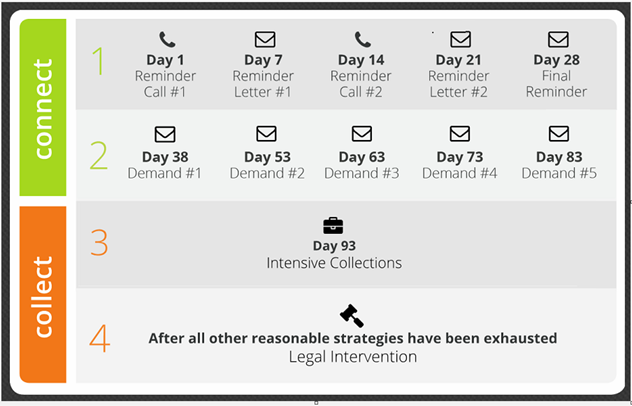According to the annual CFPB 2017 report, there were 130,000 people employed by 6,000 collection agencies in the “13.7 billion dollar industry”. Although the base salary of a debt collector is low (or none), he (or she) can earn a lot in commissions based on the amount of debt he collects. In this article, we assume that the reader of this article (you) is a debt collector.
Related article: Top debtor excuses and how to handle them
This is a fairly long and comprehensive article. We have attempted to make it as informative as possible.
Best case scenario:
Some individuals did not pay because they simply did not realize the seriousness of not paying the bill till they heard from a debt collector, or they had simply forgotten to clear the dues. This happens more often than you would think. Lucky for you, such cases can often be cleared amicably in a single call.
1. Prerequisites
a) Prepare your mind:
Before making a collections call, ensure you are fully relaxed, regardless of how bad your last collections call was. Tell yourself, “I will remain calm during this call, no matter what“. Let’s agree that a collections call from a debt collector is the last thing anyone wants to receive on any given day. About half of the debtors (or less) will talk to you properly, others will give you excuses, and some may even be nasty or abusive. Do not let any of this impact you. It’s a part of your job. Laugh it off after the call is over. The debtors need to understand that you are calling to work with them, not against them.
No checking Facebook, WhatsApp, Instagram, News or Sports during the call. Keep your cell phone aside and avoid surfing the internet. Stay focused and Listen carefully.
b) Yes, some debtors owe nothing. Your data could be incorrect or outdated:
Accept it, there is a possibility that the debtor might have already paid the debt, just that you are unaware of it or your corporate system is not up to date. In such cases, take whatever payment proof the debtor can provide and end the call nicely. Get the payment proof validated.
Collection calls are commission-based. The collection agency gets paid only when the debtor makes a payment. The debtors are ideally required to pay the collection agency directly, and then the agency remits the amount back to their clients after deducting their collection fees. Occasionally, debtors pay directly to the clients; in this case, the clients must pay the collection fees back to the agency. Your client could have just forgotten to inform you guys about this payment. Rarely, but you may come across some sneaky clients who intentionally do not tell you about the amount they have received, hoping to avoid paying your collections fees.
And lastly, it is possible that the person does not owe the debt or is protected since he is legally bankrupt. The debt could also be past the Statute of Limitations (SOL). Clarify your company’s policy when handling such accounts.
c) Inaccurate billing by clients:
Inaccurate billing and overcharging is other big complaint from debtors. This is particularly common in the insurance industry and phone and cable companies. These clients generally have no problem paying off the debt, provided the bill is fixed per their understanding. Listen to the debtor. If he sounds genuine and the difference is large, then discuss the matter with your supervisor after the call for a further course of action. At times, the debtor owes a lower amount or nothing.
d) Be Professional, Confident, and Somewhat Authoritative:
Imagine the debtor is sitting in front of you. Your attitude should be somewhat similar to a recruiter. Personally, whenever I have taken a job interview, I tend to be in my best behavior, and act professionally yet authoritatively.
Be polite, a debt collector does not have the option to get angry. He should also avoid using any “Sense of humor” during the call. Something may be funny for you but may be offensive to the debtor. It is a good practice to keep a smile on your face while making these collection calls. It helps to maintain a positive attitude. Never eat or drink during the call.
e) Compliance:
Be aware of the FDCPA laws (Fair Debt Collection Practices Act) and other applicable state laws. Never cross those limits. Other laws like HIPAA or TPCA may also apply.
f) Review all the documents that you have before the call:
Scanning the related documents once you are on the phone with the debtor will look unprofessional and unprepared. Here is some minimum information you should have before making the call.
* Exact amount owed
* What services and products were sold, and on what date?
* Date when the payment was due.
* Payment terms and any other supporting documents.
* A summary of previous communication between your client and your collection agency.
* If any payment has been made so far.
* Are you permitted to settle the debt for a lower amount?
Many debtors crosscheck the information a debt collector has about the debt to fend off the collector. But if within the first 30 seconds the debtor strongly feels that the collector must have sufficient information about the debt, he will likely not go into further details, the tide will quickly turn from interrogation to how the debtor is going to pay.
g) Maximum time for the call:
Do you want to spend the same time collecting on a debt that is $100 vs which is $1000, probably No? You do not want to spend too much of your and the company’s time on a small debt. If the collection call on a lower outstanding debt happens to go for a longer time than anticipated, and it is still unclear whether the call is going productive or not, try to get the debtor back from auxiliary discussions or end the call nicely, and possibly call the client at a later time. Try to keep your call short but effective.
2. Starting the call – First thing first:
a) Are you talking to the right person:
By law, you are not allowed to discuss collection matters with anyone other than the debtor himself (or the co-signer of the debt if the debtor is unreachable/unable to pay). This is also called the No-Third party disclosure law. Ensure that it’s the right person on the other side. Some debt collectors verify customers by checking their last four digits of SSN or address. Start your call by speaking clearly and confidently, neither too loud nor too soft.
b) If someone else picks the call:
If the person on the phone does not know the debtor, then the debtor’s contact information may have changed. You may need to do an advanced Skip Tracing to locate the debtor.
If this other person asks what you are calling about, you can simply say it’s regarding some business matter. In case it’s the debtor’s correct number, just that he is not available at the moment, you can either call at a later time or politely leave a message with your name and number and request them to pass it to the right person.
c) Landline or Cell Phone
It is always beneficial to be aware if you call on the debtor’s landline, cell phone, or work phone. FDCPA Collection laws are more strict when calling on the cell phone. In some states calling on the cell phone is prohibited by default, unless the debtor has permitted you.
d) Voicemail
You can leave a voicemail but do not mention that the call is regarding a past-due bill because if it is a shared voicemail box, then you can potentially disclose the debt to an unrelated person and violate FDCPA. Leave your name and number and request the debtor to call you back.
Good morning, my name is [ your name]. We have an important message from [company name] for [Mr. John Doe]. Please call [company’s telephone number] and mention the reference number [***xyz] when you call us back.
3. Your collection call starts now:
a) Address the debtor by his First Name, and avoid using words like “Sir / Mam / Bro/ Buddy / Sis”.
b) Tell the debtor that this is an attempt to collect a debt. Any information obtained will be used for collection purposes only. Some debt collectors record collection calls.
You must legally disclose that you are a debt collector and calling regarding an unpaid bill.
A little off the topic – These states require All-Party Consent if the call is recorded. (Washington, Pennsylvania, New Hampshire, Nevada, Montana, Michigan, Massachusetts, Maryland, Illinois, Florida and California.) This list could have changed by now, but overall your agency will make you aware of their call recording procedures and/or if you need to ask the debtor’s permission before recording the call.
c) Then you let them know who your client is, and from whom you got the actual debt ( the original creditor).
d) Make them aware that the client has legally authorized your collection agency to collect the debt on their behalf.
e) Then, immediately, ask the debtor how they would like to pay. Most collection agencies will accept payment over the phone. Get ready for all kinds of debtor excuses. Most likely, the debtor will tell you the reason for non-payment, but if they do not, ask them.
f) If you end the call without getting a payment or without a commitment to the payment date/amount, that call has been wasted.
g) Sound serious about getting the payment. If you do not show seriousness and haste, the debtor won’t get serious either.
h) You can indirectly have the debtor accept the debt by asking, “Do you have any more questions regarding this debt?”
i) If the debtor says that he will make payment at a later date, then immediately ask him it will be by Check, Credit Card over the phone, Money order, (or other options like Western Union). Most debtors reply that they will mail a check and ask which Bank/Credit Union they will use. All this will reflect how serious you are about paying the bill off. If the debtor demands a return envelope to make the payment, confirm their latest mailing address. In fact, sending a payment envelope is encouraged as an additional payment reminder.
j) If the debtors say they do not have money now, ask them when they will get their salary. Tell them to remit the following day and if they can call you to confirm when the payment has been sent. Besides asking open-ended questions to get as much information as possible from the customer. to nail down a commitment eventually.
k) Many debtors will start explaining their financial hardships, although they may be correct but do not fall for those and yet do not appear indifferent. Take a middle route – “I understand why you are feeling this way“.
l) Try to finalize the payment arrangements. If the debtor cannot pay a lump sum, then offer them to pay in installments. “To prevent you from going further into the debt, I can offer you to make payment in installments“.
m) If the debtor is unreasonably aggressive or angry, ask them, “It appears that have called you at a wrong time. When will be a good time to call you again.”
n) Take short notes, so you can recall what happened during the call. It will also help you to pinpoint if the debtor changes his story in the next call. Before the call ends, let the debtor know you have taken notes from this call. All this conveys your seriousness in collecting the debt.
o) Give a short pause after your questions, especially when you ask for the payment arrangements, and allow the debtor to speak. Short silences are a powerful tool in debt collections; they will likely spill vital information.
p) Debtors may get angry, emotional, embarrassed, and even yell at you. Remember to stay calm and focused. Over time you will get immune to all these things. But, you can never threaten a customer. Making false statements like “You can go to jail” or “We know how to get money out of people like you” is completely prohibited.
q) If the debtor is unwilling to pay at all, politely let him know the consequences of not paying the debt, including entry of this unpaid bill on his credit history.
Read your company’s policy before telling the debtor that “this account may be transferred to the legal team” is acceptable or not. If debtors feel they are about to get sued, they will also contact a lawyer making your collection efforts even harder.
r) The debtor has the right to tell you never to call him. He can also tell you to perform all collection activities in writing rather than a phone call. These are his legal rights.
s) Lastly, if the collection call is unfavorable, try to end the call rather than hanging up intelligently. This will help avoid making matters worse.
4. After the call ends:
a) Finalize/formalize your notes from the call, including dates on which the debtor has agreed to send money.
b) Most debt collectors become better over time. Do not hesitate to ask your co-workers (collectors) how they would have tackled a situation that you could not handle well during the call.
c) If you unfortunately/mistakenly violated any collection laws or yelled back on the debtor, make your supervisor aware immediately before the situation worsens. Any unfortunate/critical situation should be documented and communicated to your supervisor immediately.
d) Tell yourself to contact the debtor on the date on which you agreed to talk again or when the payment is supposed to be made. Regular follow-ups will maintain the pressure on him.
5. Debtor’s Legal rights:
a) Beware, the debtors are more aware of their legal rights than ever. There is an unlimited supply of articles and videos telling the debtor how to escape from making payments. Many of these videos provide valid information but more often than you think, these videos go overboard and end up providing misinformation. People posting these videos are often not even associated with the collections industry or lawyers. Their experience and suggestions may not fully fit with the debtor’s situation. They often arm themself with this misinformation and argue with you unnecessarily.
Even the state collection laws vary largely by state, which these videos do not discuss. Many people post these misguided videos just to make money out of advertisements, nothing else. So yes, there is pretty good information online regarding the debtor’s rights, but there is an equal amount of incomplete/misinformation out there that a debtor may not realize.
Then some lawyers make a living by filing lawsuits against the collection agencies. Many debtors are so loaded up with information (and misinformation) that they may start sounding attorneys themselves.
b) According to consumerfinance.gov, the debtor has the legal right to ask you these things:
* Identity of the debt collector, including name, address, and phone number
* The amount of the debt, including any fees such as interest or collection costs
* What the debt is for and when the debt was incurred
* The name of the original creditor
* Information about whether you or someone else may owe the debt
The debtor can also tell over the phone or send the collection agency in writing:
* I do not owe this debt.
* I need more information about this debt.
* I want the debt collector to stop contacting me.
* I want the debt collector only to contact me through my lawyer.
* I want to specify how the debt collector can contact me.
* Dispute the debt itself within 30 days of the first contact.
A debt collector needs to be flexible and handle situations smartly and diplomatically. A collections call is never easy. There is no magic wand to collect a debt.
The information presented here is not a piece of legal advice or something which fits all situations. There are way too many situations and laws beyond what has been covered above. A large portion of this article is based on my co-workers’ feedback during my last 20 years in the collections industry.
We would appreciate your feedback on this article and how to enhance it further.
References:
https://www.consumerfinance.gov/ask-cfpb/what-should-i-do-when-a-debt-collector-contacts-me-en-1695/


